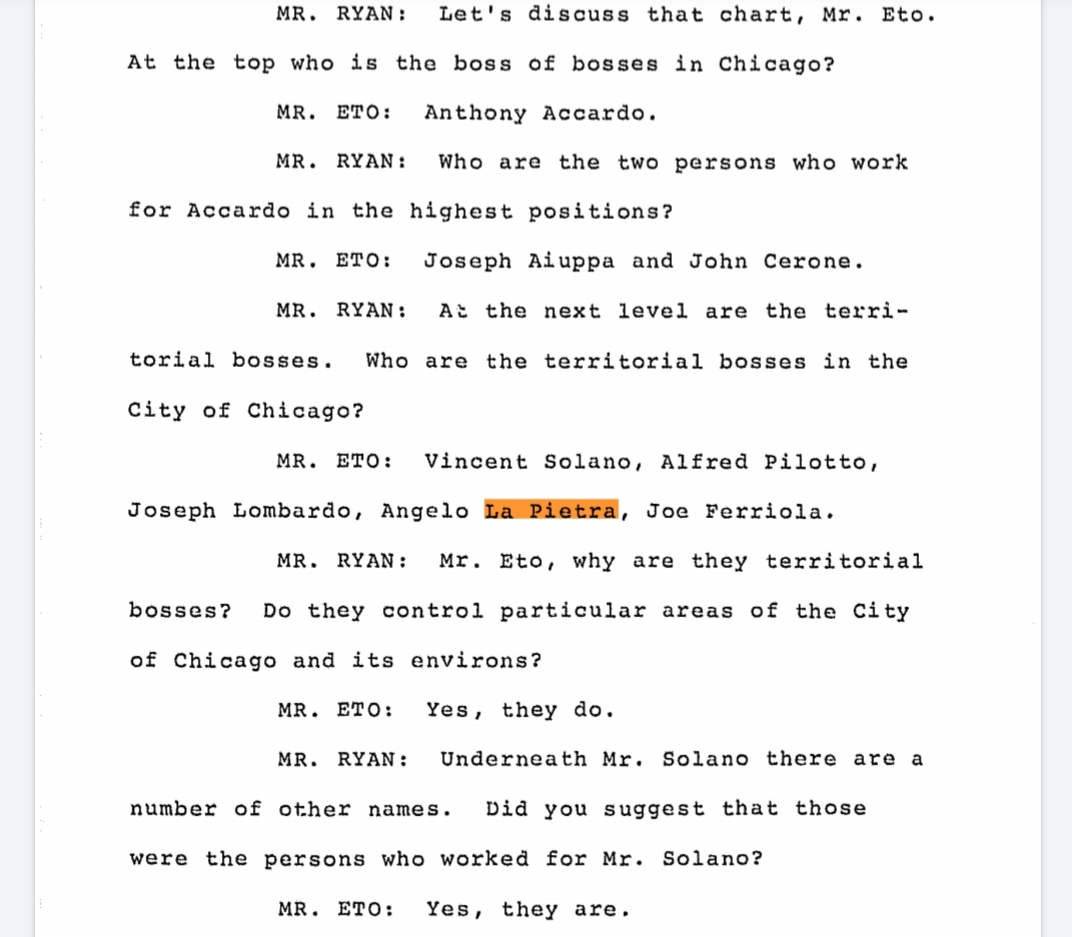Thanks for posting these. Great discussion. Perhaps Costello indeed expected LaPorte to bring the matter to Alex and Ferraro. I personally don't think we can get that from the Costello/Mooney convo though, where to me it seems just as likely that Costello wanted LaPorte to intervene himself, as he was in control of liquor licensing in the Region. If it was just a matter of bringing the beef to Fusco's direct superiors so that they could tell him to knock it off, I still would think that Costello's capodecina could do that himself. In the Alderisio/Luzi thing you posted, it seems to me that Alex's issue was that one of LaPorte's "buttons" brought the matter to them without going through his capo (LaPorte), violating the protocol regarding the chain of command. If the chain of comman went Costello -> Costello's capo -> LaPorte, then that could've been an issue for Costello's complaint. I don't see that this was necessarily the case though. I'd imagine that Costello or Giancana would've mentioned this if this were the problem. Also, given that Costello twice described his superior specifically as a "capodecina" (just to make it clear that it's not me putting words in his mouth!), I'd also imagine that his capo would have the prerogative to advocate for one of his guys to another capo or the admin (hard to imagine how he would be a "capo" if he didnt have that right). When LaPorte wasn't responding to Costello's entreaties for assistance, Costello's capo told him to go to Giancana to get the beef with Fusco straightened out.Villain wrote: ↑Tue Mar 30, 2021 1:11 pm One example on how the territorial boss system works...like i previously said, Costello probably expected for LaPorte to talk to Alex and Ferraro and so heres an example of a guy who allegedly didnt follow protocol and how Luzi was introduced....
And few other examples...
One of things that continues to make these questions challenging, is how to square a formal rank like "capodecina" with terms like "district boss", "ward boss", "territorial boss", "crew boss". I still wonder how much terms were like district boss were used within the actual "Chicago LCN family". While sometimes this was likely just casual street usage (e.g., calling Lombardo the "boss" of Grand Ave, etc.), along the lines of New York guys calling someone a "captain" or "skipper", I'm always wary that some of this nomenclature could have been imposed by LE. An example was the description of Vince Solano as a "territorial boss" attributed to Joe Eto. Was this the term actually used by Eto to describe Solano, or a term imposed by the FBI in their interrogations of Eto and in preparing his testimony for court? The question becomes all the more tricky when we consder sources that weren't made vs. made guys. Whatever the truth was about these terms, it's notable that neither Costello nor Giancana use them (neither did their mysterious Italian interlocutor, of course). Instead they use formal, precise LCN terms like capodecina and avvocato. This would make sense, given that this was a beef between two made guys being arbited by the boss of the family.
The fact that Curry answered to LaPorte I don't think really bears on this discussion one way or the other, as he was not a made guy (as Mooney would've said: "he ain't in the clique").


